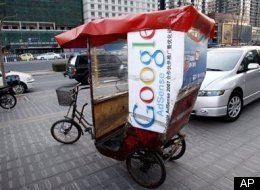
Where would we be without the internet? Places where access to the internet and news is limited, people have found their own ways of reaching out. Digital distribution is meant to help people gain as much information as possible and to do it quickly. In China, Google launched Google.cn, to give the citizens more access to the internet (Google Blog). However the Chinese government wants even more limited access to citizens and less capabilities to give them free speech. Without free speech and the access to the internet how are citizens going to be able to keep up with online news and information. Google is even trying to work with the Chinese government and if nothing good comes from this meeting between the two, Google will be forced to shut down Google.cn. Which I think could be harmful to the Chinese people.



It seems odd that the Chinese government wants to limit it's people to strict use of the internet, when China is a very technologically advanced country. We shall wait and see, but hopefully China realizes what they will be loosing. To learn more about whats happening with China and Google go to the official Google Blog...http://googleblog.blogspot.com/2010/01/new-approach-to-china.html
In countries where there is no free speech and cameras are prohibited, people are finding ways to get their message out. They are using cell phones!! Cell phones equipped with the internet and cameras are a great source of information sharing when the government prohibits what you can and cannot say. For example in a video from Myanmar, released by "ABC", they show footage of people fighting. The reporter was not allowed in the country with his camera so he used his cell phone and was able to report that way. So people will find ways of getting around limited use of the internet and cameras. If they want their message heard bad enough they will find different ways of getting it out.
Here is a link to that video.... Myanmar Cell Phone Journalism: http://abcnews.go.com/Video/playerIndex?id=3666307.
The internet is helping people make change by allowing them to post their own videos and share their version of stories. It is also helping by allowing citizen journalists to post their videos of whats happening in countries where cameras are not allowed. For example "YouTube", they have what is called "YouTube Direct", this allows citizen journalist to upload photos and videos to news websites. Although its probably not going to get them famous, it does make them feel like that are doing their part and sharing with the world what is going on in other countries around the world where journalists are not allowed. Here is a link to YouTube Directs website if you want more information on how to use it...http://www.youtube.com/direct
All in all, people are wanting exposure and connection with other people around the world, less government interference and more internet and news. Stopping the information is going to make people want it even more. Google I hope will beat China! And true to this website, people are going to work around government filters.
To read more about the competition against Google and China visit...http://roomfordebate.blogs.nytimes.com/2010/01/15/can-google-beat-china/
RESOURCES
http://www.pcworld.com/article/182362/youtube_direct_why_citizen_journalists_shouldnt_care.html
http://googleblog.blogspot.com/2010/01/new-approach-to-china.html
(Picture from http://www.huffingtonpost.com/2010/01/26/china-google-negotiate-to_n_436494.html)

